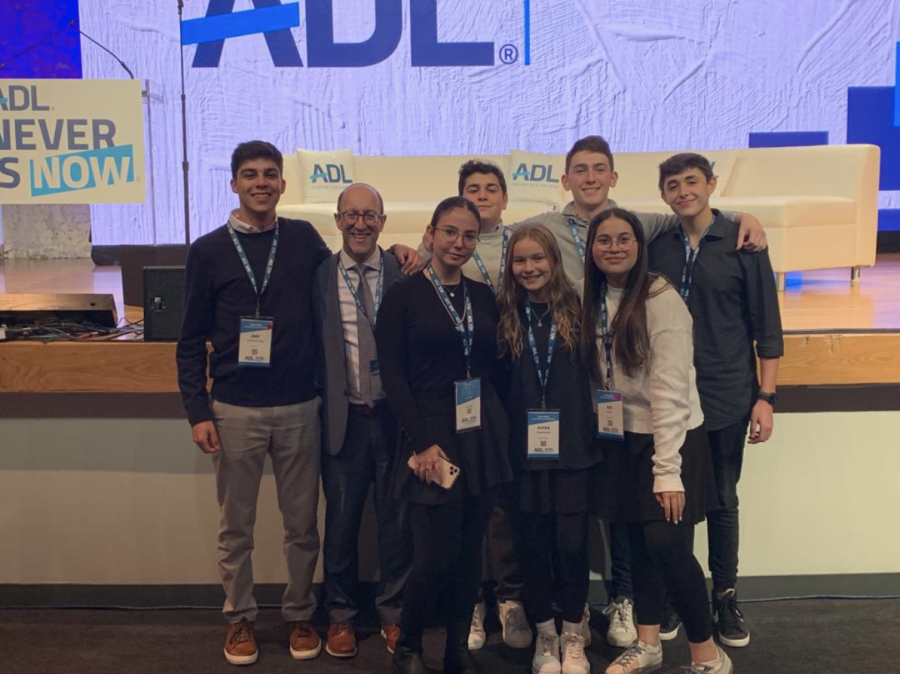Never is Now: ADL Summit on Antisemitism
On Thursday, November 10th, as Ramaz students met with their teachers for annual student-teacher conferences, seven students and Rabbi Lookstein traveled to the Javits Convention Center for the Anti-Defamation League’s (ADL) Never is Now Summit on Antisemitism and Hate. Upon exiting the train station and walking to the Javits center, the student group felt immersed in the honor, recognition, and sense of solidarity emanating from the convention center. To discuss and learn about anti-semitism in the presence of so many experts, celebrities, and passionate advocates for the Jewish people was as exciting for the group as it was fruitful.
But not all who showed up to the conference held it in such high esteem; as soon as the students wrapped around the corner to walk through the doors, they were confronted by many angry protestors. While it is perplexing to think that people would protest a conference dedicated to combatting the irrational, violent hatred of Jews across the globe, as the group got closer, they realized that many of the protesters were the Neturei Karta, a Hasidic anti-Zionist group. They parked trucks outside the center with screens that read, “ADL ignored Jew Hatred on campus for decades!; ADL went woke, its leader is a joke.” For the students, the jarring encounter with the protesters not only reinforced the importance of the event but also put into perspective the scale and scope of the problem faced by advocates against anti-semitism.
There were many sessions that described the ways antisemitism has been encouraged across the United States. One session described the actions of the Mapping Project, an anonymous group known for compiling a map of specific physical locations of Boston-based Jewish people and organizations. The points disclose the addresses of the ADL and Jewish day schools, as well as those of Jewish philanthropists and community leaders. The anonymous group not only posts their connections with government, corporations, and universities but also calls for permanently disrupting those relationships. This reflects a larger trend of companies being pushed to boycott Israel and divest their support away from environmental, social, and governance movements in Israel.
The impact of the Mapping Project on Jewish communities in Boston has been harmful and significant. There are high levels of anxiety due to the fear of escalating hateful acts. The deputy regional director of the New England Division of the ADL even referred to Boston as “the test kitchen of antisemitic hate.” From college campuses like Harvard and Wellsley endorsing BDS to Tufts, which “pledged to not associate with student groups that recognize Israel as a Jewish state,” college campuses in the region entertain a great deal of antisemitic thought. When organizations like the Mapping Project call for dismantling & physically disrupting Jewish organizations, they encourage antisemitic action. The scope and consequence of these actions and behaviors are not limited to college campuses, as they cut deep into the safety and well-being of Jewish communities. Some of the common phrases that help to endorse violence against the Jewish people include calling Zionism “a harm” and “exploitative,” as well as those that give validity to the conspiratorial claim that Jews “use money nefariously.”
The ADL has been working closely with the FBI to discourage the spread of information about the private lives of Jewish figures across Boston. While the project’s server has since been de-platformed, this tactic has not disappeared. Today, the Mapping Project remains alive, using servers in Bulgaria that the FBI has not been able to trace.
Organizations like the Mapping Project are not anomalous. In fact, groups with similar antisemitic beliefs and critics appear across the United States. As recently as this year, two Jewish students at SUNY New Paltz were expelled from an on-campus sex abuse survivor group for expressing their views on Israel.
In response to the growing prevalence of these issues, the summit posed an essential question: How can we be less reactive and more proactive when fighting antisemitism? The first strategy involved identifying and making allies through relationship building. Solidarity with other communities (such as the Ukrainian refugee community) is another powerful way to forge supportive alliances. There is also a significant emphasis on the need for collaboration with local Jewish organizations and community leaders. For instance, students had the opportunity to hear from ADL’s CEO, Jonathan Greenblatt. Raymond Ashkenazie ’24 said that “[Jonathan Greeblatt] explained to us how important it is to be proud of our Mizrahi or Ashkenaz identities and be able to share our stories.”
Equally important is the education component that provides a blueprint for how to talk about antisemitism in ways that can help the general public better understand the situation beyond mainstream talking points. It also advises avoiding extending educational efforts to Israel-opposed extremists, as the time and energy required to make any progress is much better spent on people who are less intensely attached to the issue and more open to Zionist perspectives. Adi Erdan ’24 learned that “whether it’s on social media or in real life, we always should speak up and be active. Even if it’s a small action—everything we do will help and have a good influence. We should never be scared to act.”
Writing about the issue and engaging with local papers and media outlets are also great ways to advocate against antisemitism proactively. Emy Khodorkovsky’s ’24 takeaway was “to take action in any form, no matter how big or small and no matter the perceived consequences.” In the realm of college campuses, where anti-Zionist sentiments run rampant, the ADL recommends contacting them to establish a connection to advocacy resources to support proactive advocacy against antisemitism on campus.
The summit left the students feeling empowered and ready to take on the challenges of advocating for Israel and the Jewish community: “We need to be confident in who we are and what we believe in and show our views’” said Ben Davidovitch ’24.



